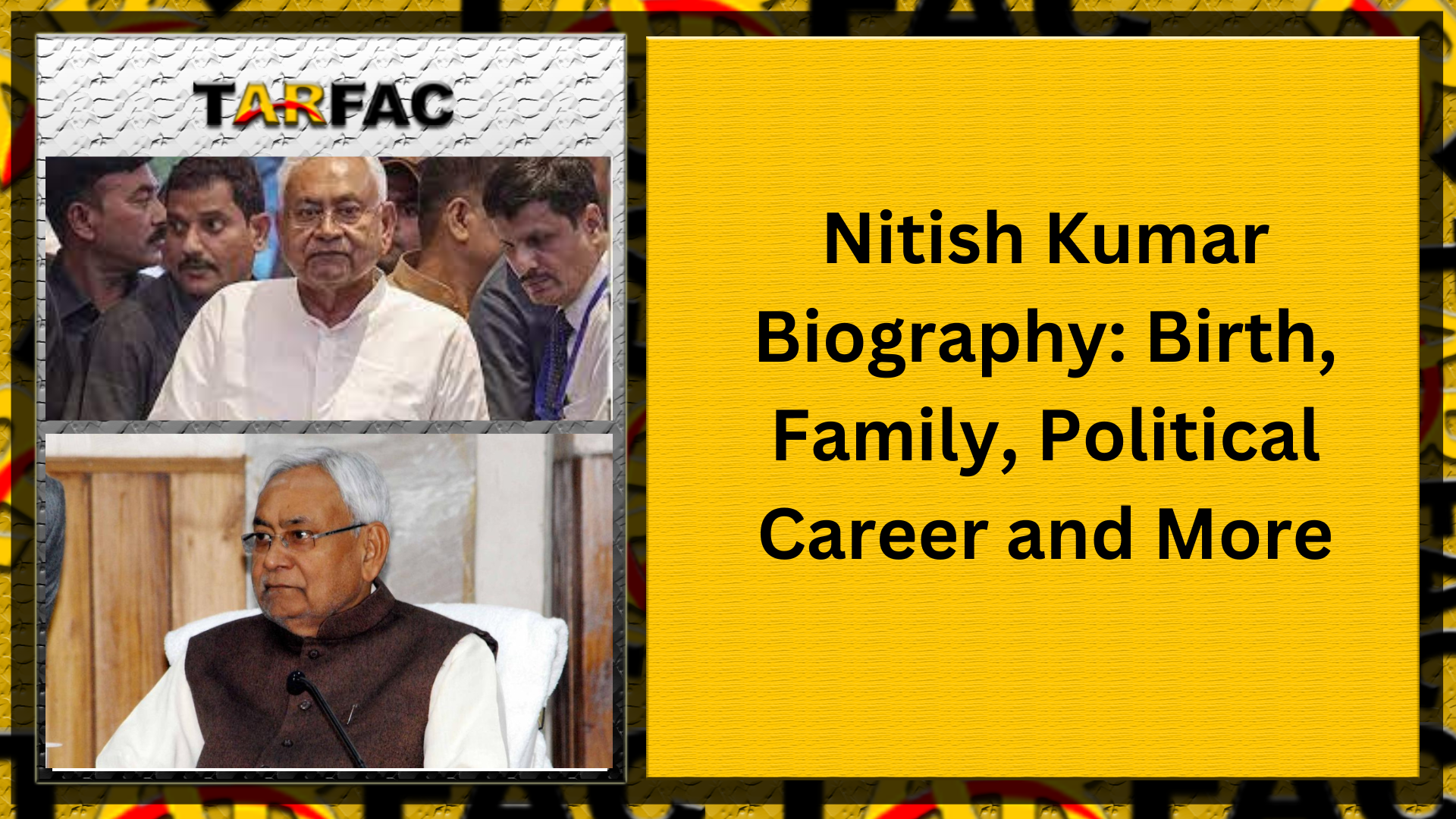Nitish Kumar:
Nitish Kumar, born on 1 March 1951, is a prominent Indian politician and the current Chief Minister of Bihar, serving in this role since 22 February 2015. He is a member of the Janata Dal (United) and holds the distinction of being Bihar’s longest-serving chief minister, having been elected to the position for the ninth term.
Early Life
Nitish Kumar was born in Bakhtiarpur, Bihar, to Kaviraj Ram Lakhan Singh, an ayurvedic practitioner, and Parmeshwari Devi, who hailed from Nepal. Nitish belongs to the Kurmi agricultural caste, and his nickname is ‘Munna.’ He completed his degree in Electrical Engineering from Bihar College of Engineering (now NIT Patna) in 1972. Initially working for the Bihar State Electricity Board, Kumar later transitioned into politics.
In 1973, Nitish Kumar married Manju Kumari Sinha, and they had one son. Sadly, Manju Sinha passed away in 2007 due to pneumonia.
Political Career
Nitish Kumar entered politics as a member of the Janata Dal, winning his first election to the state assembly from Harnaut in 1985. Initially supportive of Lalu Prasad Yadav, he later switched allegiance to the BJP in 1996 after winning his first Lok Sabha seat from Barh. The Samata Party, founded by Kumar and George Fernandes in 1994, later merged into the Janata Dal (United) in 2003.
In 2005, the NDA, led by Nitish Kumar, secured a majority in the Bihar Legislative Assembly, and he became the Chief Minister, forming a coalition with the Bharatiya Janata Party (BJP). He continued to hold the position through consecutive terms, showcasing his administrative prowess and commitment to development.
Political Alliances and Rifts
In June 2013, Nitish Kumar broke ties with the BJP over the naming of Narendra Modi as their prime ministerial candidate. Subsequently, he formed the Mahagathbandhan, a coalition with the Rashtriya Janata Dal (RJD) and Indian National Congress, aligning with the United Progressive Alliance (UPA). However, in 2014, following severe losses in the general elections, Kumar resigned as chief minister.
His attempt to return to power in 2015 led to a political crisis, resulting in the resignation of Jitan Ram Manjhi, who had succeeded him. Nitish Kumar once again assumed the role of Chief Minister. The Mahagathbandhan secured a significant majority in the state elections later that year.
In 2017, Nitish Kumar parted ways with the RJD over corruption allegations and rejoined the NDA, forming a coalition with the BJP. The political landscape in Bihar witnessed further shifts, and in the 2020 state elections, Kumar’s government was narrowly reelected.
In August 2022, Nitish Kumar left the NDA and rejoined the Mahagathbandhan and UPA. However, in January 2024, he once again switched alliances, rejoining the NDA.
Achievements as Chief Minister
Nitish Kumar’s tenure as Chief Minister has been marked by various developmental initiatives and administrative reforms. He prioritized law and order, addressing issues such as organized crime and left-wing extremism. Kumar introduced the Arms Act, set up special courts for expedited convictions, and recruited retired army officials to form the Special Auxiliary Police (SAP) to combat Maoist challenges.
The government’s push for a speedy trial led to a significant drop in cases registered under the Arms Act, reflecting a positive impact on law and order. The administration also focused on prison reforms, implementing measures like mobile phone jammers and actively enforcing the All India Prison reforms program outlined by the Supreme Court.
In addition to law and order reforms, Nitish Kumar’s government worked on social justice initiatives, consolidating the support of Extremely Backward Castes (EBC). The introduction of reservations for women in Panchayati Raj institutions and the promotion of EBC leaders within the party aimed at social inclusion and representation.
Controversies
Nitish Kumar has faced criticism for his frequent changes in political alliances, earning him the moniker ‘Paltu Ram,’ signifying someone who frequently changes allegiance. Additionally, he has been criticized for not contesting elections directly during his political career.
Biographies
Several biographies have been written about Nitish Kumar, including “Single Man: The Life and Times of Nitish Kumar of Bihar” by Sankarshan Thakur and “Nitish Kumar and The Rise of Bihar” by Arun Sinha.
Awards and Recognition
Nitish Kumar has received several awards and recognitions for his contributions, including the Anuvrat Puraskar for enforcing total prohibition on liquor in Bihar in 2017, JP Memorial Award in 2013, and being ranked 77th in Foreign Policy Magazine’s top 100 global thinkers in 2012.
Conclusion
Nitish Kumar’s political journey reflects a dynamic and influential presence in Bihar’s political landscape. His emphasis on development, law and order, and social justice initiatives
More story in Hindi to read:
Moral stories in Hindi for class
Check out our daily hindi news:
What is the family background of Nitish Kumar?
Kaviraj Ram Lakhan Singh, Nitish’s father, practiced ayurvedic medicine, while his mother Parmeshwari Devi hailed from Nepal. Nitish is a member of the Kurmi agricultural caste and is affectionately called ‘Munna’. He successfully obtained a degree in Electrical Engineering from Bihar College of Engineering (now NIT Patna) in the year 1972.
Who is the home minister of Bihar?
Home Department, Bihar Overview of the Agency Budget for the Fiscal Year 2016–17: ₹7,297 crore (US$910 million) Responsible Minister: Nitish Kumar, Chief Minister of Bihar and Home Minister Executive Officer: Senthil K Kumar, IAS, Principal Secretary (Home) Official Website: [Website Link]




